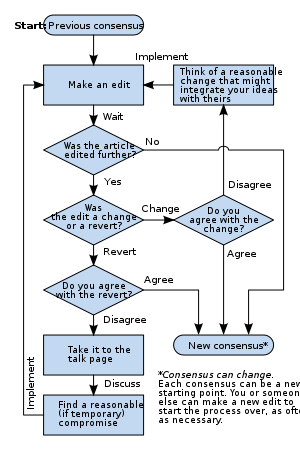Wikiversity:Consensus
This page documents a Wikiversity guideline that participants recommend you follow with occasional exceptions and common sense. Please propose and discuss before making significant changes to ensure your revisions reflect consensus. |
This page is to describe how consensus is relevant to Wikiversity, and to provide guidance for Wikiversity participants in using this principle in action.
Wikiversity consensus

Introduction
The wiki process typically goes by creating consensus. Building consensus helps the work of Wikiversity only if participants are learning from developing a common view. Consensus is typically reached as a natural product of the editing process: a change or an addition to a page will either stand or be challenged. Letting an edit stand suggests that one consents to that edit. In the case of community-wide issues, such as policy changes, community-wide participation and consensus is necessary. In the case of a specific learning resource, if substantial disagreement regarding appropriate content or approach remain after substantial discussion, it may be productive to consider creating multiple resources.
Definition
Consensus is both a process and a product of discussion in order to construct a shared understanding and a broad agreement about a particular proposal/process/resource etc. Consensus within the Wikiversity community is formed through a process by which the community discusses a particular issue, and, after thorough discussion, reflects what the community is thinking. Consensus usually means that a large majority of community members who have discussed a proposal have provided good reasons for either adopting or rejecting a given proposal - however, any majority of opinions in a discussion or poll is only an indicator of consensus, and not the consensus itself. Evaluating consensus, therefore, is a complex process of ascertaining what the 'mood' of the community is, attempting to reflect the mood of the community as a whole, and not simply a majority within the community.
Wikiversity's decision-making process is fundamentally based in consensus, in that it is always attempted to reflect the wishes of the community as a whole, rather than a majority. When people do not fully agree with a given proposal, the proposal should be modified to satisfy as many people as possible, if not the entire community.
A guarantor of academic freedom
The consensus process within the Wikiversity community is meant to be a guarantor, not an inhibitor, of academic freedom.
- Consensus does not function as a way to disrupt Wikiversity or hinder the work of Wikiversity editors. Wikiversity participants who are productively editing content development projects and learning resources do not have to justify their work by demonstrating that community consensus exists supporting the pages they create and their editing of those pages. Wikiversity participants are free to create new pages and new educational content as long as their efforts support the educational mission of Wikiversity. There might only be a single Wikiversity participant who is interested in a particular topic or only a minority of discussion participants who will speak in favor of having a page for a particular topic, but there is no requirement to establish consensus before learning resources about such a topic can be developed.
- Consensus is not established just by counting votes. Wikiversity is guided by ideas that are in harmony with the education-oriented mission of the project. In judging consensus, it is the responsibility of all community members to give the most weight to rational arguments that support positions and points of view that are in harmony with the Wikiversity mission. Community members should assign less weight to discussion comments or votes that provide no rational argument to justify a point of view or that disrupt the project.
Who evaluates consensus?
Consensus is not evaluated by any one person - evaluating consensus is also a discursive (and contestable) process - meaning that someone can propose consensus has been achieved, and someone else can disagree, meaning that the discussion continues. In certain circumstances, a particular person is given the responsibility for evaluating consensus - for example, the conferring of custodianship status, which is given to a bureaucrat. However, this decision, as with anything in Wikiversity, is up for discussion and/or debate.
Etymology of the word "consensus"
The Wikipedia article "Consensus decision-making" provides an etymology: "It has its origin in the Latin word cōnsēnsus (agreement), which is from cōnsentiō meaning literally feel together.[1]" and indicates that "as a decision-making process, consensus aims to be:[2]"
- Inclusive: As many stakeholders as possible should be involved in the consensus decision-making process.
- Participatory: The consensus process should actively solicit the input and participation of all decision-makers.
- Co-operative: Participants in an effective consensus process should strive to reach the best possible decision for the group and all of its members, rather than opt to pursue a majority opinion, potentially to the detriment of a minority.
- Egalitarian: All members of a consensus decision-making body should be afforded, as much as possible, equal input into the process. All members have the opportunity to table, amend and veto or "block" proposals.
- Solution-oriented: An effective consensus decision-making body strives to emphasize common agreement over differences and reach effective decisions using compromise and other techniques to avoid or resolve mutually-exclusive positions within the group.
See also
References
- ↑ "Consensus - Definition". Merriam-Webster Dictionary. Retrieved 2011-08-29.
- ↑ "Consensus Decision-making How to use consensus process". Consensusdecisionmaking.org. Retrieved 2011-08-29.
External resources
- Wikipedia article on consensus decision-making
- Wikipedia policy on consensus
- Wiktionary definition of consensus
